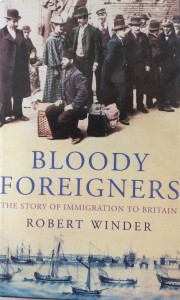 Offensichtlich ein Buch, das gut für die heutige Zeit passt, auch wenn es bereits im Jahr 2004 erschienen ist. Darüber hinaus ein wohltuendes und empfehlenswertes Buch: Winder behandelt Immigration nicht als „Problem“; er versucht konsequent, weder eine xenophobe noch eine xenophile Haltung einzunehmen; er berichtet und erzählt sine ira et studio. Und all dies in bester britischer liberaler Tradition.
Offensichtlich ein Buch, das gut für die heutige Zeit passt, auch wenn es bereits im Jahr 2004 erschienen ist. Darüber hinaus ein wohltuendes und empfehlenswertes Buch: Winder behandelt Immigration nicht als „Problem“; er versucht konsequent, weder eine xenophobe noch eine xenophile Haltung einzunehmen; er berichtet und erzählt sine ira et studio. Und all dies in bester britischer liberaler Tradition.
Neben den immer wieder hochinteressanten Details, die sich in der Jahrtausende-alten Geschichte der Immigration nach Britannien finden, zeigt Winder vor allem in den ausgezeichneten Acknowledgements und der Einleitung auch große Linien und findet einsichtsvolle Perspektiven:
- Es gibt keine englische oder britische Kultur ohne Immigration. Das, was wird heute als englische Kultur wahrnehmen, ist durch dauernde Immigration entstanden. Winder zitiert in diesem Zusammenhang ein Gedicht von Daniel Defoe von 1700:
A true born Englishman’s a Contradiction
In Speech an Irony, in Fact a Fiction. - Identität und Identifizierung ist erstaunlich flexibel: A man or a woman can cheer for England at the World Cup, Britain at the Olympics, Europe at the Ryder Cup, Scotland against Wales, Sussex in the Country Championship, and the West Indies in Test matches. Our loyalties can be fluid and overlapping.
- Die Perspektive auf Immigranten kann sich deutlich verändern, wenn man sie um 180° dreht und dieselben Personen als Emigranten betrachtet: There is a built-in tendency to to present immigrants as passive or problematic second-tier characters, as guests or mere visitors with certain obligations of deference and gratitude towards their ‚host‘. Emigrants are much more dashing – adventurous, eager, intrepid, fun. (…) Migrants ceased to be the feeble, dependent figures of so much cartoon myth-making, and became plucky explorers on the sharp, often painful edge of social progress.
- Immigration an sich ist nicht „gut“ oder „schlecht“. Es kommt darauf an. Vor allem kommt es darauf an, was man daraus macht: I now find it pointless even to brood on whether it can be described as a ‚good‘ or a ‚bad‘ thing. It is like wondering whether it is good or bad to grow old. Nor can immigration be conceived of as a single experience. For the man who meets the woman of his dreams, or makes his fortune, it is a happy process; for the boy knifed at a bus stop by a gang of violent bigots, it is a catastrophe.
Ein Gedanke zu „Bloody Foreigners: The Story of Immigration to Britain. Robert Winder“
Die Kommentare sind geschlossen.